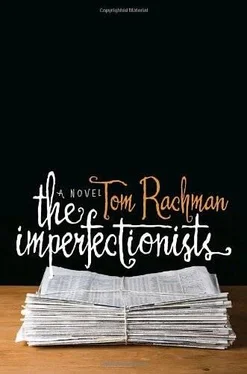"Your aspect," he says, "recalls that of a chimpanzee."
She is humming softly and offers no response. After a minute, she says, "And you remind me of an orangutan."
"I can't argue with that. Nope, I cannot argue with that. By the way," he adds, "I have a new one for you: Tina Pachootnik."
"Say it again?"
"Pachootnik. Tina."
She shakes her head. "Impossible to say."
"Do you like Tina at least?"
"I'm willing to consider it."
She has been looking for a pseudonym, not for any purpose but because it took her fancy. "What about Zeus?" she asks.
"Taken, I'm afraid. Though he's been gone long enough that there'd be little room for confusion. Would you use it like that-Zeus, on its own-or would it be Zeus something?"
She opens her pudgy hand within his cool dry palm and he releases her. She drifts, stepping over her own feet, beside him but abstracted, apart. Then she swoops back, plunges her fingers into his, and looks up, nostrils swelling with mischief.
"What?"
"Frog."
"I forbid it," he says. "Frog is a boy's name."
She shrugs, an oddly adult gesture in such a little girl.
They enter one of the opulent antiques shops on Via dei Coronari. The clerks watch Arthur and Pickle closely. The two of them come here often, never buying, except once, when she knocked over a mantel clock and Arthur had to pay for it.
She prods a 1920s telephone.
"You hold that part to your ear," Arthur explains, "and you talk into the other bit."
"But how do you make a call?"
He sticks his fingers into the dial and cranks a rotation. "You've never seen a phone like this before? My God, when I was growing up this was all we had. Imagine the strife! Hard times, my dear, hard times."
She purses her lips and pivots to investigate a bust of Marcus Aurelius.
Back home, Arthur prepares her a Nutella sandwich. She eats one every afternoon, legs dangling from the kitchen chair, smudges of chocolate accruing on the underside of her nose.
He tears off the crust and pops it into his mouth. "Father tax," he explains, chewing. She does not object.
When Visantha's car pulls up outside, Pickle hurriedly swallows her last bite and Arthur hastens to rinse off the sticky plate-it is as if a teacher approached.
"How was work?" he asks his wife.
"Okay. What are you guys up to?"
"Nothing much."
Pickle ambles off to the television room, and Arthur absentmindedly follows. They chat in there and laugh at their TV show.
Visantha trails in. "What are you watching?"
"Just some junk," he replies.
Pickle hands him the remote and wanders off to her room. He watches her go down the hall, then turns to Visantha. "You know what she told me today? She doesn't remember the twentieth century. Isn't that terrifying?"
"Not particularly. What are we doing for dinner?"
"Pickle," he calls down the hall. "Any thoughts on dinner?"
The secretaries book Arthur from Rome to Geneva by rail, a ten-hour journey with connections in Milan and Brig. Supposedly this saves money on a short-notice flight but is a colossal nuisance for him. He boards the early train at Stazione Termini, buys pastries in the cafeteria carriage, and, squashed amid the second-class rabble, settles into the first volume of Erzberger's memoirs, which is called, modestly, In the Beginning. From the author photo, Erzberger is, or was, in her early thirties, pretty and gaunt, with shoulder-length dark hair and twisted, ironic lips. The picture is from 1965, when the book came out. She must be in her seventies by now.
As his train pulls into Geneva in the early evening, he lifts his nose from the book and stares at the seat-back before him. From the blurbs on the Internet, he had expected a weary, politically dated autobiography. Instead, her prose communicates courage and humanity. He studies her photo again and feels scandalously unprepared.
He passes customs, obtains Swiss francs, and finds a cabbie who will take him to her house, which is just across the French border. The taxi drops him on a wet country road; the red taillights disappear down the hill. He is sweaty, uncertain, late. He dislikes being late, yet invariably is. He rubs his hands together, huffs a breath cloud onto them. This is the place: the right number, the pines, as she described. After a little searching, he finds a gate within the pleached fence and enters. Her home is built of sturdy timber beams, with icicles hanging from the eaves like wizards' caps. He snaps one off-he can never resist-and turns around to survey the twilight sky. A crust of clouds overlays the Alps. The icicle drips down his wrist.
She opens the door behind him.
"Hi, hi, sorry I'm late," he says, then switches to German. "Sorry, I was just admiring the view."
"Come in," she says. "You can leave the icicle outside, please."
The living room is illuminated by potted lights that pick out columns of dust in the air. An ebony coffee table bears an overflowing ashtray and a moonscape of stain rings from hot mugs that spilled. On the walls, African war masks leer. The bookshelves are perfectly stocked from wing to wing, like a residence whose management has ceased accepting new applicants. The room smells of strong tobacco and of hospital, too.
Erzberger's hair is short and white, and when she passes under the lights her scalp is visible. A tall woman, she wears a hand-knitted sweater that hangs loosely around her throat, like a sock that has lost its elastic. For trousers, she has flannel pajama bottoms, and on her feet, sheepskin slippers. The sight reminds him that it is cold; he shivers.
"What would you like to drink? I'm having tea."
"Tea would be perfect."
"So can I assume," she asks, half turned toward the kitchen, "that you're writing my obituary?"
He is caught out. "Oh," he says. "Why? Why do you ask?"
"What are you writing, then? You said on the phone it was a profile." She disappears into the kitchen, returning a minute later with his steaming mug. She places it on the coffee table, motions him to a black leather armchair, and sits on the matching couch, which does not sink to accommodate her as he expects but holds its shape as if bearing her upon its palm. She reaches to the table for her cigarette pack and lighter.
"I mean, yes," he admits. "It is for that. For an obituary. Is that awful to hear?"
"No, no. I rather like it. This way, I'll know it's accurate-I won't have a chance to send a letter of complaint afterward, will I." She coughs, covering her mouth with the cigarette pack. She lights one. "You?"
He declines.
A lick of smoke slithers from her mouth, her chest rises, and the thread is yanked back inside. "Your German is excellent."
"I lived in Berlin for six years as a teenager. My father was a correspondent there."
"Yes, right-you're the son of R. P. Gopal, aren't you."
"I am."
"And you write obituaries?"
"Primarily, yes."
"Claw your way to the bottom, did you?"
He responds with a polite smile. Writing for an international newspaper in Rome normally earns him a degree of respect-until, that is, people learn of his beat.
She continues: "I liked your father's books. What was that one with 'Elephant' in the title?" She glances at her bookshelf.
"Yes," Arthur says. "He was an excellent writer."
"And do you write as well as he did?"
"Alas, no." He sips his tea and pulls out a notepad and a tape recorder.
She crushes her cigarette in the ashtray, picks at the stitches on her slippers. "More tea?"
"No, I'm fine, thank you." He turns on his tape recorder and inquires about the start of her career.
She answers impatiently, adding, "You should ask me other things."
"I know this is basic. I just need to confirm a few facts."
"It's all in my books."
Читать дальше












